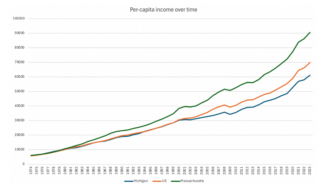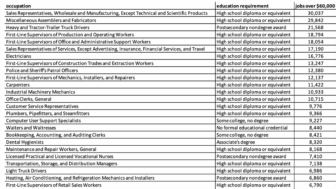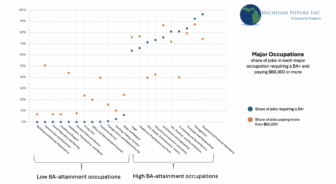Wayne County Executive Warren Evans’ column for The PuLSE Institute entitled Michigan needs long-term poverty policy is worth reading. Both in its call for ![]() making attacking poverty a priority and for taking on the conventional wisdom about the causes of poverty. Evans writes:
making attacking poverty a priority and for taking on the conventional wisdom about the causes of poverty. Evans writes:
Misconceptions about poverty and the poor continue to nurture flawed policies. The prevalent myth is that jobs are the silver bullet to defeat poverty. Yes, jobs are necessary for people to improve their lives. But a real job which can support a family is often the last step out of poverty, not the first and only. Prescribing jobs as the panacea for poverty is based on three misconceptions about jobs, access to jobs and people who don’t have jobs.
First, it can’t be just any job. It has to be a job that pays enough to stay above the poverty line. That’s not the kind of job usually available to the poor. As underemployment continues to grow, the working poor can put in 40 hours a week and still fall below the poverty line. It’s getting harder, if not impossible to “pull yourself up by your bootstraps.”
Second, it assumes anyone can access jobs. Many people in Southeast Michigan struggle to access jobs primarily due to outrageously unaffordable auto insurance rates and a lack of adequate public transit. Too many residents are forced to decide between driving illegally or missing work. Many also struggle to compete for life-changing jobs because of lack of access to quality education and training. The result: Too many barriers to access a decent job.
These two misconceptions feed the third, which is the most dangerous and offensive misconception: The poor are lazy. It’s mentally easier and more comfortable for people to believe the poor are the cause of their poverty rather than acknowledge we have a system that caters to the haves and actually prevents many of the have-nots from moving up the social ladder. The all too common belief that laziness causes poverty is exacerbated by housing patterns. People see a concentrated area of poverty, with mostly black residents, and inaccurately conclude that their poverty comes from some common trait, like skin color.
Exactly! With 40 percent of Michigan households unable to pay for basic necessities dealing with this reality should be a state economic priority. And we need a completely new agenda to deal with the problem. Both finding a way to deal with the multiple barriers that face those who are not working. And to deal with way too many jobs that do not provide the pay and benefits needed to be able to pay the bills, save for one’s retirement and for the kids’ education.
What such an agenda should look like is the subject of our report: A Path to Good-paying Careers for all Michiganders: Sharing prosperity with those not participating in the high-wage knowledge-based economy.
We believe that the key is having good-paying jobs and careers for all. Where careers are for forty years, not a first job. The prime focus of economic policy must be helping people have a career of good-paying work.
We agree with President Regan when he said a job is the best social program. To us a good-paying job is the best social program. Except for those retired or unable to work at a good-paying job due to physical or mental disability, the best path to a middle class forty-year career are good-paying jobs.
We do not believe that we have a too generous safety net that discourages people from working. As we documented in our State Policies Matters report Minnesota has a far more generous safety net than Michigan. And it is second in the proportion of those 16 and older working, Michigan is tied for 37th. If the same proportion of Michiganders age 16 and above worked as Minnesotans there would be 725,000 more Michiganders working today.
Our agenda for getting more Michiganders working and to make work pay more for those in low-wage jobs has four core pillars:
- Helping Michiganders get family-supporting employment through a combination of income supports and comprehensive and customized case management. Services could include housing, childcare, transportation, substance abuse support, mental heath, job training, financial education, etc. These services and income supports should continue beyond a first job.
- Using TANF (Temporary Assistance to Needy Families) funding to help those out of work or underemployed get family supporting jobs. To provide low-income families with a safety net that acts as a trampoline rather than a snare (as described by former Massachusetts Governor William Weld). Michigan instead has been a leader in getting out of the business of providing cash grants or services designed to help people get to self-sufficiency.
- Augmenting wages and benefits through some combination of employer mandates and/or a strengthened safety net. (The employer mandate recommendations are the area where we have the most disagreement among the Michigan Future Board and staff.) But we all recognize that to achieve the goal of getting all Michiganders on the path to good-paying careers that income from work will need to be augmented for many.
- Reforming the criminal justice system: To achieve fewer imprisoned, shorter time spent in prison and barriers to work removed after release by providing alternatives to arrest and prison sentences; shortening sentences and reducing recidivism; and mitigating the negative impacts of incarceration once time has been serve.







